The 7 essential rituals for focused deep work

Parent Post
Focus is incredibly important.
Focus is incredibly important. But often we struggle to turn it on when we need it. The right rituals can help a lot.
After all, repeated patterns form stronger connections. Thus if you pair a consistent ritual with focused work, it can be easier to transition your mind into a state of productivity.
Note Your Starting Time.Tracking
Note Your Starting Time.
Tracking your deep work hours is an essential step. The idea is that you maintain a tally or timelog of when you do focused work throughout the day. This makes focus more salient than the simple feeling of being busy all day.
Setting the intention to focus is half of the battle. Noting the time encourages you to get moving on your work right away.
What Makes a Good
What Makes a Good Ritual?
A good ritual for focused work has two parts:
- It should be accessible most, if not all, of the time you plan to work
- It should assist with getting into work, rather than needlessly adding steps that turn it into a tool for procrastinating.
Here are some rituals that might just help.
Plan Your Work Session.What
Plan Your Work Session.
What exactly are you going to work on? How are you going to work on it? What steps will you follow?
Once you have a concrete plan like this, getting started is relatively easy—you just have to follow your plan. But without a plan, it’s easy to play on your phone or look at email as you aren’t sure what to focus on.
Put on Noise-Cancelling Headphones.Wearing
Put on Noise-Cancelling Headphones.
Wearing headphones has two effects.
First, you can block out some of the ambient sound around you. Even if you can’t afford fancy noise-cancelling headphones, regular headphones with some rain sounds playing will do the trick.
Second, headphones create a social cost for interrupting you. If someone needs to tap a shoulder to get your attention, this creates a subtle barrier to being interrupted.
Bonus tip: Avoid music with lyrics while trying to concentrate.
Move to a Focused
Move to a Focused Space.
Our memories are context-dependent. Our attitudes and habits flow from the environment we’re in. You’re more likely to feel the urge to eat when near the fridge, than when driving your car, for instance.
Even more, certain memories and skills are more accessible in certain contexts. If you study in the same room you take an exam in, you’ll do better due to this preferential activation. Thus consistently picking the same space for focused work can tune you into the right state of mind.
Go Easy on Yourself.Anxiety
Go Easy on Yourself.
Anxiety is a major cause of procrastination. You feel the upcoming work will be unpleasant, so you find a way to distract yourself to get out of it.
Sometimes this anxiety can come from the standard you expect from yourself. You want to write a brilliant essay but have no ideas.
“I’m just going to show up” is something you can even write down on a post it before you start, reminding you that what matters is giving yourself space to focus, rather than reaching arbitrary performance standards.
Switch Off All Notifications.A
Switch Off All Notifications.
A necessary step for any focused work session is to prevent the distractions you can control. This means, at minimum:
- Turn off all notifications on your phone.
- Make sure your email inbox is closed.
- Turn off notifications on your computer.
An additional step might be to put your phone in a desk drawer before you start working. Sometimes the impulse to check your phone comes from you, not others, so its best to not have it as a visual cue.
Of course, allow emergency numbers to go through, but say complete no to text messages and app notifications (including FWD).
Put Up a Do
Put Up a Do Not Disturb Sign.
The sign needn’t be literal—telling people around you that you’re going to do some focused work is often enough.
This is especially helpful if you work from home. You may have kids, spouses or roommates that want to engage with you. Signaling to them when you’re trying to do focused work is a good way to prevent being interrupted in the middle of a session.

